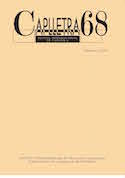Educating students with heritage languages: present views and future challenges
DOI:
https://doi.org/10.7203/caplletra.68.16476Keywords:
heritage languages, multilingualism, education, identity Abstract
Abstract
Given the increase of mobility and migration phenomena, around 244 million people around the world are migrants. This trend has turned diversity into one of the main characteristics of contemporary societies. In this context, multilingualism has become highly valued and, consequently, language learning is amply promoted. We will specifically focus on heritage languages (HLs). A HL can be defined as a language spoken at home which, crucially, is not the dominant language of the community at large. In this article, we will basically focus on HLs in educational settings and take also into account the new languages to which migrant students are exposed to, in addition to maintenance and promotion (or lack thereof) of HLs in the host community. Additionally, we will refer to different HL teaching programmes, considering their characteristics and efficiency, and we will focus mostly on Catalan-speaking territories as well as on the connection between LHs and identity. Finally, we will mention some future challenges in these areas from a pedagogical viewpoint and provide some concluding remarks.
 Downloads
Downloads
Downloads
Published
How to Cite
-
Abstract1008
-
PDF (Català)699
Issue
Section
License
Authors submitting work to Caplletra for publication must be the legitimate holder of the usage rights. Legitimacy for the purposes of publishing the work must also include images, tables, diagrams and any other materials that may complement the text, whether they are the author of such material or not.
Copyright: on publishing their work in the journal, the author grants Caplletra. Revista Internacional de Filologia usage rights (reproduction, distribution and public communication) for both the paper printed version and for the electronic version.
All work published in Caplletra is covered by the Creative Commons license type Attribution-NonCommercial-NoDerivatives 4.0 (CC BY-NC-ND 4.0).
RESPONSABILITY
Caplletra. Revista Internacional de Filologia does not necessarily identify with the points of view expressed in the papers it publishes.
Caplletra. Revista Internacional de Filologia accepts no responsibility whatsoever for any eventual infringement of intellectual property rights on the part of authors.






